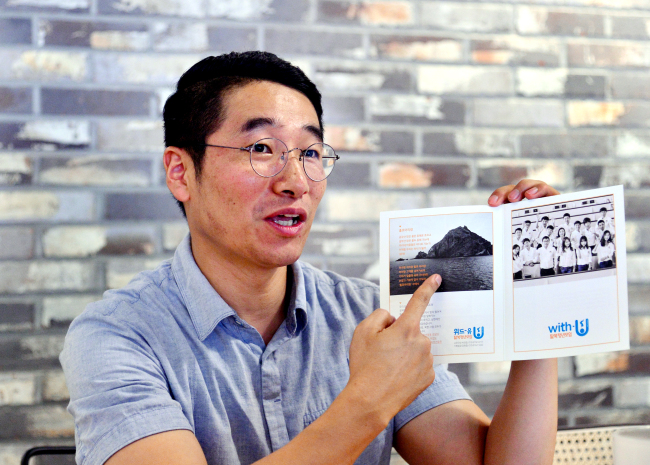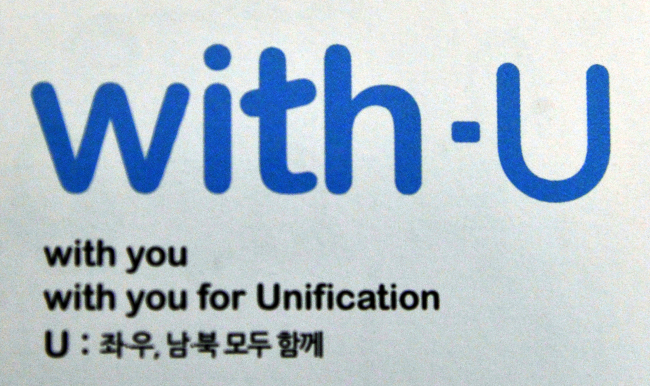The Korea Herald is publishing a series of articles featuring inter-Korean relations to mark the paper’s 65th anniversary that falls on Aug. 15. Following is the third installment. -- Ed
After 65 years of division of the two Koreas, uniting with North Korea is nothing more than a far-fetched dream for many young South Koreans, who remain indifferent to the reclusive country -- if not fearful or hateful toward it for its nuclear and missile provocations.
Unlike the older generation that views the divide as a legacy of the past that should be overcome, many young South Koreans appear to be less emotionally attached to North Koreans and more worried about the influx of North Koreans that could threaten South Korea’s economic prosperity.
 |
Park Young-cheol (Park Hyun-koo/The Korea Herald) |
But for those who came from North Korea, reunification is what they desperately need because that is the only way they can return home, Park Young-cheol, who leads a campaign for reunification, said in an interview with The Korea Herald.
“I can see longing for reunification fading away as time goes by,” said Park, who arrived in South Korea in 2001. “That’s why we came to conclude that it is us, North Korean defectors, who should step up a movement for reunification first.”
In South Korea, the movement for reunification traces back to the Syngman Rhee administration when South Korea’s first President Rhee aspired to absorb the North in a military fashion. Since the 1950-53 Korean War, the unification movement has become deeply polarized, with conservatives leading an anti-North Korea campaign and liberals seeking to improve inter-Korean relations and expand cross-border exchanges.
Led by Park, eight young North Korean refugees, all in their 20s and 30s, founded the organization with-U in 2011 to lead efforts to bring forward reunification and prepare South Korean people for a reunified Korea. It now has some 35 members.
In 2013, they held a music concert and performed a song, “Arirang Alone,” to raise donations for North Korean refugees without families living in South Korea, which marked the beginning of their journey to raise awareness of North Korean defectors and campaign for reunification.
“We are alone and lonely. In North Korea, we are called traitors. In South Korea, we are seen as failed people who could not integrate into South Korean society. That’s why we chose the song, ‘Arirang Alone,’” he said.
 |
with-U (Park Hyun-koo/The Korea Herald) |
Born in a country with one of the world’s strictest regimes, Park had to travel between China and North Korea to feed his family. He was caught crossing the Dooman river by guards patrolling the border and was sent to prison camps on four occasions.
When he finally made it to South Korea in 2001, he had to fight prejudice and discrimination against North Koreans, which lowered his chances of getting a job and standing on his own feet.
“For me, it was difficult adjusting to South Korean society when I first got here because I spent my teenage years in North Korea,” he said. “The government should invest in North Korean defectors for them to lead a stable life.”
“North Korean defectors could serve as a bridge to narrow the inherent gaps between people from the two Koreas if they are reunified because we have an understanding of lives both in South Korea and North Korea.”
It is estimated that 30,000 defectors have made the journey to South Korea, according to the Unification Ministry.
“Now, I have a family and life here after getting through all the difficulties. But I increasingly miss my hometown. I see my hometown in my dreams. I sometimes search for the name of my hometown online to get a glimpse of how it has changed,” he said. “To go home, the Koreas should be reunified.”
Following their first concert held in Seoul in 2014, the with-U members went to the disputed islets of Dokdo, claimed by both South Korea and Japan, to perform the song with a renowned K-pop singer, Lee Seung-chul. Together they have recorded an official campaign song called “The Day.”
In 2015, they arranged lectures aimed at fostering a balanced view of history of the two Koreas, and in 2016, they held another concert in front of Brandenburg Gate in Berlin, Germany, which experienced reunification, all funded by the Hana Financial Group.
The projects are based on their belief that there should be balanced view of reunification, relations between the Koreas and their shared history, so that young South Koreans can be given a chance to decide whether reunification will be beneficial for them.
“To prepare for reunification, we think that we should help South Koreans change their perception of North Korea and North Koreans, and understand that we are the same people and we can contribute to society,” he said.
A flurry of diplomatic efforts to denuclearize North Korea and bring about lasting peace on the Korean Peninsula through a series of summits involving the Koreas and the US in recent months has heightened expectations for reunification, even among young South Koreans.
According to a recent survey of 1,521 South Koreans by the Culture Ministry, 8 out 10 Koreans responded that the two Koreas would eventually become a unified nation in the long term. Some 65 percent of the respondents answered that the socio-economic gains from reunification would be “big” or mostly big.
“We have never imagined it. I think reunification could really take place one day,” he said.
“But reunification won’t come suddenly without any efforts. We must work to make it happen and prepare for reunification.”
(
laeticia.ock@heraldcorp.com)









